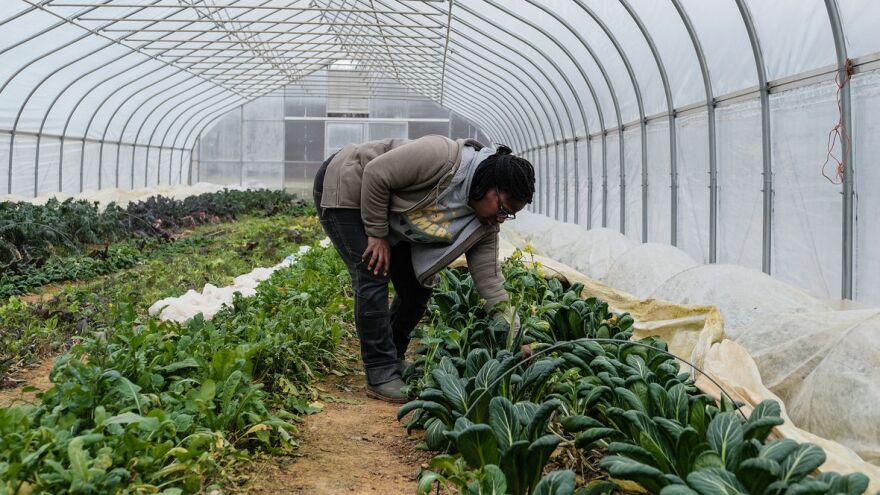The Equity Commission at the U.S. Department of Agriculture has released its first report detailing over 30 recommendations to bring equity to farming.
The USDA Equity Commission was born out of a Biden executive order calling for federal departments to address racial equity and underserved communities. It is led by outgoing Deputy Secretary Jewel Bronaugh and United Farm Workers President Emeritus Arturo Rodriguez.
The release of the report comes on Bronaugh's last day. She is the first Black woman to serve as the No. 2 spot at USDA.
"We didn't want this set of interim recommendations to look like things we've seen in previous reports," Bronaugh said at the unveiling of the document Tuesday morning. "We wanted to get at systemic change."
The group met earlier this month to vote on recommendations ranging from making it easier for farmers to qualify for conservation programs to making the language in Farm Service Agency loans more accessible – actions they believe the USDA can get a head start on. A final report is due by the end of the year.
"There's a reason why this is different. We have very serious people around this table," said Agriculture Secretary Tom Vilsack during the report's unveiling at the department Tuesday morning. "People that have lived experiences, people who have studied and dedicated their life to these issues and it would be disrespectful for us not to take this work incredibly seriously."
What does the commission recommend?
The 32 recommendations span across four main areas: how USDA works with farmers daily, changes to the structure of the department, farmworkers and other USDA programs such as nutrition assistance. The report recommends that the department:
There are dozens more recommendations that range from supporting congressional legislation, conducting research into how programs are distributed, expanding language access and more.
In a response, Vilsack details dozens of actions already taken to address the report's concerns
USDA cites having already begun the process of entering into partnerships with nonprofits, reducing paperwork for loan applications and launching an online program to help producers understand which loans they may qualify for in an effort to reduce the rates of denials and withdrawals.
"You'll find that in fact steps have already been taken in many of the areas that you can apply to be serious about this," Vilsack said. "I suspect that every federal agency has had some history in terms of discrimination, but this is a department that has been willing to begin the process of opening itself up to review — to having folks take a critical look not just at individual circumstances, but systemic issues."
In closing, the response — which details past actions and new programs already announced — USDA "thanks the Equity Commission for contributing so vitally to that mission and looks forward to ongoing engagement with the Commission to identify opportunities to advance equity for all."
A broader attempt to fix a broken past
Helping Black farmers is among the accomplishments to advance racial equity and opportunities the Biden administration highlightedahead of a visit to Selma, Ala., to mark the 58th anniversary of Bloody Sunday.
That effort to provide relief to farmers who suffered discrimination by USDA farm programs as well as the equity commission and its recommendations were born out of a broader attempt to fix a broken past.
Nearly two decades ago a class action lawsuit led by Black farmers against the USDA was settled. Then there was a class action from Native Americans, Hispanic farmers, and women farmers. Even after lawsuits from minority groups, many others including smaller farmers as well as young and beginning farmers say they are constantly left out of USDA's programs and structure.
They say barriers to access to programs include incorrect denials, cumbersome paperwork and a lack of clear communication about what applicants could qualify for to begin with.
The USDA's lending process, for the last century, is not set up to support nontraditional growers including the farmers of color who face high rejection and withdrawal rates as a result, said Zach Ducheneaux, the Farm Service Agency Administrator at USDA.
"So it might be you're a Black farmer that's operating on heirship property who hasn't had the benefit of a cooperator technical assistance provider right there on the ground with them to help them navigate this," Ducheneaux said to NPR of Black farmers who have owned land for generations but may not know how to navigate USDA's processes. "By virtue of the lack of support structure around them, they're going to come to the application process less prepared."
In fact, a recent NPR analysis found across the first two years of the Biden administration, Black and Asian-identifying farmers were the least successful in acquiring a direct loan, data shows.
Advocates for farmers of color have argued that rejections and withdrawals often happen because the multi-step application process is too cumbersome and confusing. Those whose families have generational experience and long-standing outside resources to navigate the federal bureaucracy sail through.
"We understand that for far too long there have been underserved and unserved populations that desperately need what USDA can provide," Vilsack said on Tuesday. "And as long as I am secretary I am deeply committed to making that happen."
Copyright 2023 NPR. To see more, visit https://www.npr.org.


